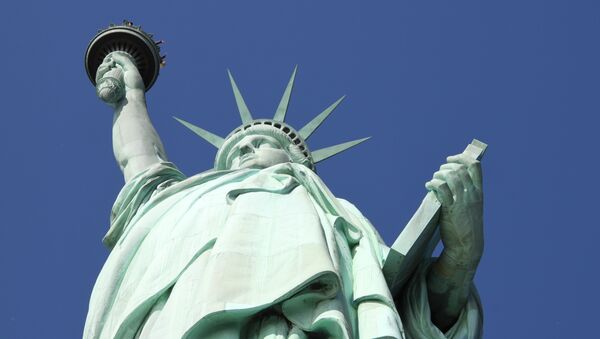Acting US Citizenship and Immigration Services Director Ken Cuccinelli on Tuesday evening doubled down on his adjustment of the Statue of Liberty poem to reflect the US President Donald Trump’s migration policy, saying the original sonnet was referring mostly to immigrants arriving from Europe.
In a CNN interview on Tuesday evening, Cuccinelli responded that he "wasn't writing poetry" and was "answering a question".
When the official was asked what he thinks the US stands for, Cuccinelli replied the poem was referencing immigrants coming from Europe.
"Of course that poem was referring back to people coming from Europe where they had class-based societies, where people were considered wretched if they weren't in the right class. It was written one year, one year, after the first federal public charge rule was written that says 'any person unable to take care of himself without being a public charge' would be inadmissible," he said.
Ken Cuccinelli made headlines on 13 August after he altered the famous poem on the Statue of Liberty's pedestal to suggest that only immigrants who can "stand on their own two feet" are welcome in the US, according to an interview published Tuesday by NPR (National Public Radio).
The iconic poem by Emma Lazarus reads "Give me your tired, your poor, your huddled masses yearning to breathe free".
An NPR journalist asked Cuccinelli whether these words are a part of "the American ethos".
"They certainly are: 'Give me your tired and your poor who can stand on their own two feet and who will not become a public charge'”, Cuccinelli replied, adding that the 'plaque was put on the Statue of Liberty at almost the same time as the first public charge was passed - very interesting timing'."
The question was prompted by the White House's "public charge" rule announced Monday.
The Trump administration released a regulation on 12 August that could slash the number of legal immigrants allowed to enter and stay in the US by simplifying the task of rejecting green card and visa applications.
Washington is thus taking steps to ensure that immigrants in the US will be self-sufficient and not a burden on US public resources, the White House said in a news release on Monday.
The new rule means many applicants with low incomes or who were expected to rely on benefits such as forms of Medicaid, food stamps, and housing vouchers could be turned down if they were deemed likely to seek future government assistance.
Under the proposed rule, immigrants who receive public benefits above a certain threshold will be known as a "public charge", the release said.
Aliens who are found likely to become a public charge will be barred from entering the United States and will not be able to adjust their immigration status.
"To protect benefits for American citizens, immigrants must be financially self-sufficient", US President Donald Trump said.
The new regulation is aimed at hundreds of thousands of immigrants who enter the country legally every year and then apply to become permanent residents.


